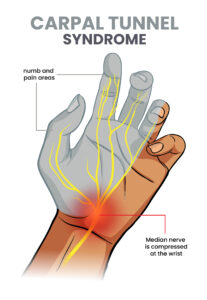What is CTS?
Carpal tunnel syndrome is a common condition that affects the median nerve, which runs from the forearm into the hand. The median nerve passes through a narrow passage called the carpal tunnel, located at the base of your wrist. When the tissues around the median nerve swell, they compress the nerve, causing pain, tingling, numbness, and weakness in your hands and fingers.
Symptoms of CTS
The symptoms of CTS can vary from person to person and may come and go over time. Some of the most common symptoms include:
- Numbness, tingling, or burning pain in the palm, fingers, and thumb
- Clumsiness or loss of dexterity in the hands
- Difficulty grasping objects
- Dropping things frequently
- Sharp, shooting pain that travels up the arm
Who is at risk for CTS?
CTS is a common condition that affects people of all ages, but it is more prevalent in women and older adults. Some of the factors that increase your risk of developing CTS include:
- Repetitive hand and wrist movements
- Pregnancy
- Obesity
- Diabetes
- Arthritis
- Thyroid disorders
Prevention Tips for CTS
The good news is that there are things you can do to prevent CTS from developing or worsening. Here are some tips:
- Take frequent breaks from activities that involve repetitive hand and wrist movements.
- Stretch your hands and wrists regularly.
- Maintain a healthy weight.
- Manage any underlying medical conditions, such as diabetes or arthritis.
- Use ergonomic tools and equipment, such as a wrist rest or mouse pad.
- Adjust your work or leisure activities to minimize repetitive movements.
Treatment Options for CTS
If you are experiencing symptoms of CTS, it is important to see a doctor or occupational therapist for diagnosis and treatment. Treatment options for CTS will vary depending on the severity of your symptoms. Some common treatment options include:
- Splints or braces to immobilize your wrist and reduce pressure on the median nerve
- Nonsteroidal anti-inflammatory drugs (NSAIDs) or corticosteroids to reduce inflammation
- Ergonomics training to teach you how to modify your work activities to reduce strain on your wrists
- Surgical decompression, which involves cutting the carpal tunnel ligament to relieve pressure on the median nerve
Living with CTS
Even with treatment, CTS can be a chronic condition that may require ongoing management. However, there are things you can do to manage your symptoms and improve your quality of life. These include:
- Avoiding activities that aggravate your symptoms
- Participating in regular hand and wrist exercises
- Using assistive devices, such as a grip tool or ergonomic keyboard
- Maintaining a positive outlook and seeking support from others who understand your condition
The Importance of Early Diagnosis and Treatment
Early diagnosis and treatment of CTS are essential for preventing permanent damage to the median nerve. If you are experiencing any symptoms of CTS, don’t hesitate to see a doctor or occupational therapist. With proper treatment, you can manage your symptoms and live a normal, active life.
A Compassionate Approach to CTS Management
At Coastline Orthopaedic Associates, we understand the impact that CTS can have on your daily life. We are committed to providing patients with compassionate and comprehensive care that addresses their individual needs and concerns. We believe in empowering our patients with knowledge and resources so they can take an active role in managing their CTS.
Your Voice Matters: Share Your CTS Experience
If you have been affected by CTS, we encourage you to share your story with others. Your experience can help raise awareness about the condition and encourage others to seek help if they are experiencing symptoms.
Share Your Feedback and Spread the Word
We value your feedback and appreciate you taking the time to read this blog post. If you found it helpful, please consider sharing it with others who may be struggling with CTS. Together, we can raise awareness about this common condition and help others find the support they need.



